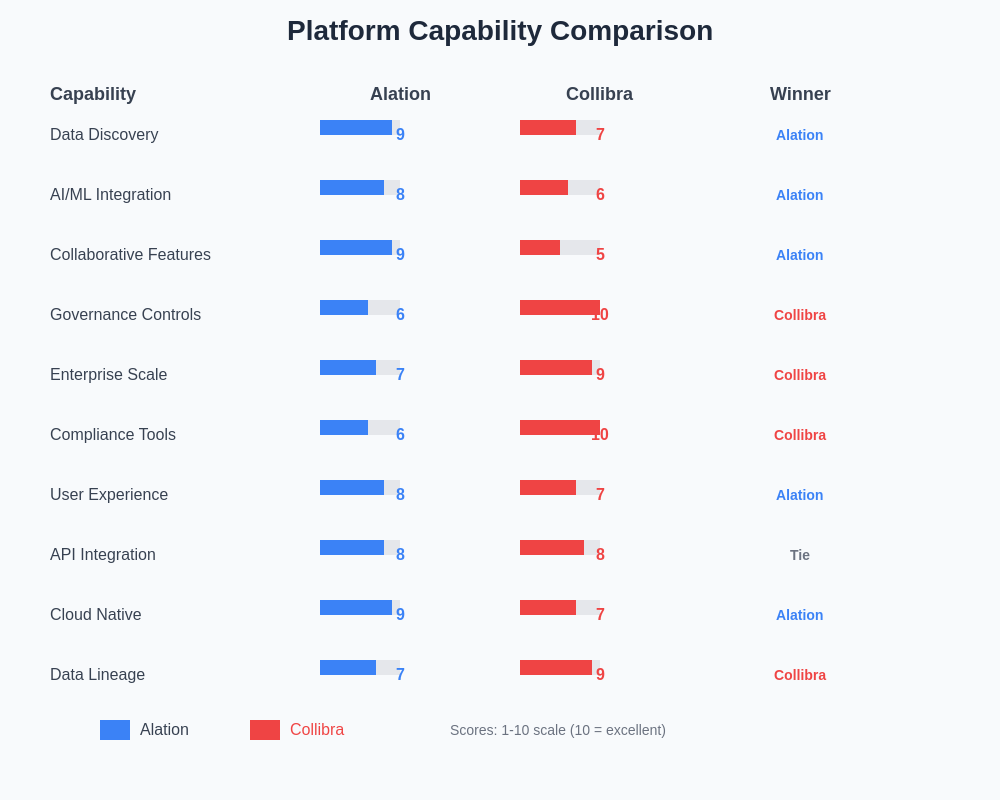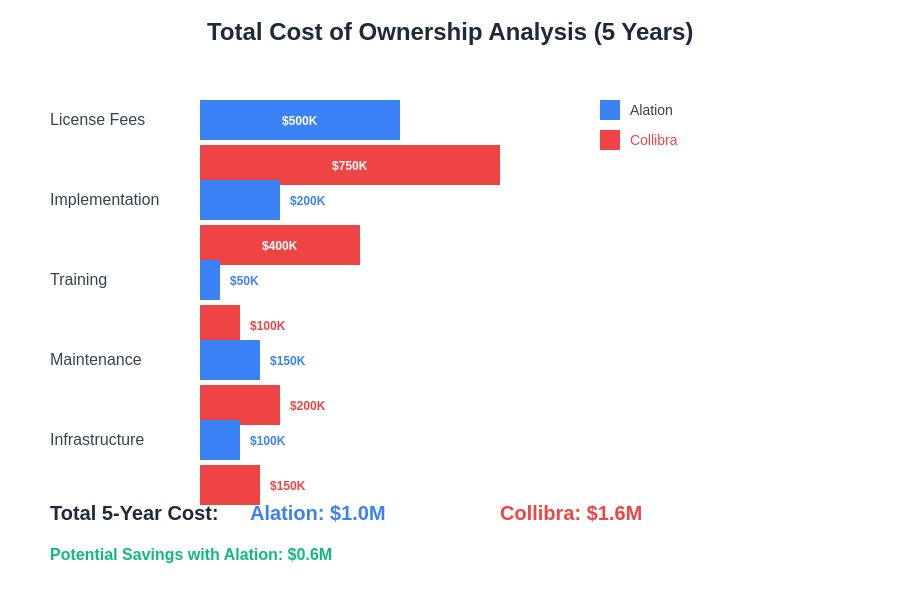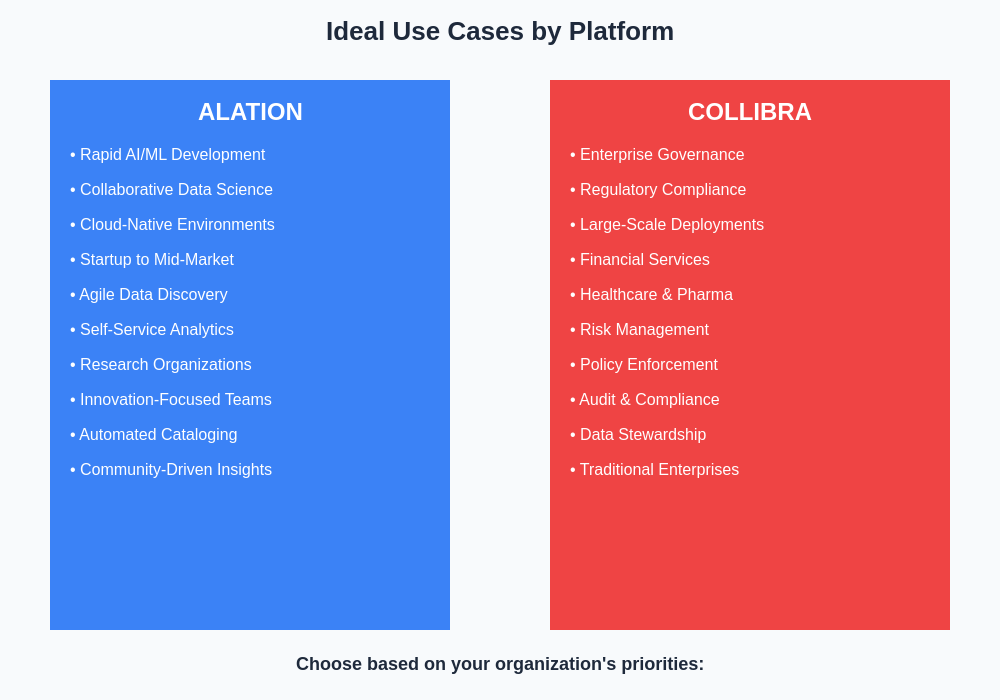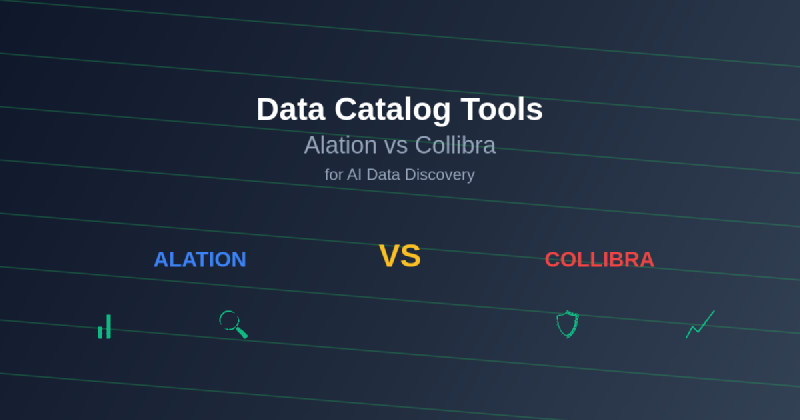The exponential growth of data in modern enterprises has created unprecedented challenges for organizations seeking to harness artificial intelligence and machine learning capabilities effectively. At the heart of successful AI implementations lies the critical need for comprehensive data discovery, cataloging, and governance solutions that can transform scattered data assets into actionable intelligence. Two industry-leading platforms, Alation and Collibra, have emerged as dominant forces in the data catalog space, each offering distinct approaches to solving the complex challenges of AI-driven data discovery and management.
Explore the latest AI trends and data management insights to understand how data cataloging technologies are evolving to support next-generation artificial intelligence applications. The choice between these platforms can significantly impact an organization’s ability to accelerate AI initiatives, ensure data quality, and maintain regulatory compliance while scaling machine learning operations across diverse enterprise environments.
The Critical Role of Data Cataloging in AI Success
The foundation of any successful artificial intelligence initiative rests upon the quality, accessibility, and understanding of underlying data assets. Traditional data management approaches often fall short when dealing with the complexity and scale required for modern AI applications, where data scientists and machine learning engineers need rapid access to reliable, well-documented datasets that can fuel sophisticated algorithmic models. Data cataloging platforms serve as the central nervous system for AI data discovery, providing automated inventory management, intelligent search capabilities, and comprehensive metadata management that transforms chaotic data landscapes into organized, searchable resources.
The importance of robust data cataloging becomes even more pronounced when considering the typical enterprise environment, where data assets are distributed across multiple systems, formats, and organizational silos. Without proper cataloging infrastructure, data scientists often spend the majority of their time searching for relevant datasets, understanding data quality issues, and establishing trust in data sources rather than focusing on model development and innovation. This inefficiency not only delays AI project timelines but also increases costs and reduces the overall return on artificial intelligence investments.
Alation: The Data Intelligence Pioneer
Alation has established itself as a pioneering force in the data cataloging space, with a particular emphasis on collaborative data intelligence and automated metadata discovery. The platform’s approach centers around creating a comprehensive knowledge base that combines automated data profiling with human-generated insights, fostering a culture of data-driven decision making throughout the organization. Alation’s strength lies in its ability to automatically discover and catalog data assets while providing intuitive interfaces that encourage data stewardship and collaborative knowledge sharing among teams.
The platform’s machine learning capabilities extend beyond basic cataloging to include intelligent recommendations, automated data quality scoring, and predictive analytics that help users identify the most relevant datasets for their specific AI use cases. Alation’s unique approach to combining automated discovery with crowd-sourced knowledge creates a dynamic ecosystem where data understanding continuously improves through user interactions and feedback. This collaborative model proves particularly valuable in AI environments where domain expertise and technical understanding must converge to produce meaningful insights.
Experience advanced AI assistance with Claude for enhanced data analysis and machine learning project planning that complements your data catalog strategy. The integration of AI-powered assistants with data cataloging platforms creates powerful synergies that accelerate data discovery and improve project outcomes across diverse use cases.
Collibra: Enterprise Data Governance Excellence
Collibra has built its reputation on providing comprehensive data governance solutions that meet the stringent requirements of large enterprise environments. The platform takes a governance-first approach, emphasizing policy management, compliance tracking, and enterprise-scale data stewardship capabilities that ensure data quality and regulatory adherence across complex organizational structures. Collibra’s strength lies in its sophisticated workflow management, role-based access controls, and extensive integration capabilities that make it particularly well-suited for highly regulated industries and large-scale enterprise deployments.
The platform’s approach to AI data discovery is deeply integrated with its governance framework, ensuring that machine learning initiatives operate within established data policies and compliance requirements. Collibra’s business glossary functionality provides standardized definitions and context that prove invaluable when building AI models that must be interpretable and auditable. The platform’s emphasis on data lineage tracking and impact analysis helps organizations understand how changes in upstream data sources might affect downstream AI applications, providing crucial visibility for maintaining model performance and reliability.
Comparative Analysis of AI Data Discovery Capabilities
When evaluating these platforms specifically for AI data discovery applications, several key differentiators emerge that can significantly impact project success and organizational adoption. Alation’s strength in automated metadata discovery and collaborative knowledge building makes it particularly effective for environments where data scientists need rapid access to diverse datasets and rely heavily on peer recommendations and insights. The platform’s machine learning-powered search capabilities and intelligent data profiling provide excellent support for exploratory data analysis and feature discovery processes that are fundamental to AI development workflows.
Collibra’s enterprise-focused approach provides superior support for organizations that require strict governance oversight of AI initiatives and need to maintain detailed audit trails throughout the machine learning lifecycle. The platform’s sophisticated policy management capabilities ensure that AI projects operate within established data usage guidelines, while its comprehensive lineage tracking provides visibility into data dependencies that can affect model performance and reliability. These capabilities prove particularly valuable for organizations operating in regulated industries where AI model explainability and compliance documentation are critical requirements.
Integration Ecosystems and Technical Architecture
The technical architecture and integration capabilities of these platforms play a crucial role in determining their effectiveness within existing enterprise technology stacks. Alation provides extensive connectivity to popular data sources, cloud platforms, and analytics tools commonly used in AI workflows, with particular strength in supporting modern cloud-native environments and big data technologies. The platform’s API-first architecture enables seamless integration with machine learning platforms, data science notebooks, and automated pipeline tools that form the backbone of contemporary AI development processes.
Collibra’s integration approach focuses on enterprise-grade connectivity and workflow automation, with robust support for traditional enterprise systems alongside modern cloud platforms. The platform’s extensive connector library and workflow automation capabilities make it well-suited for organizations with complex integration requirements and established enterprise architecture standards. Collibra’s emphasis on automated data quality monitoring and policy enforcement through integration touchpoints provides excellent support for maintaining data integrity throughout AI development and deployment lifecycles.

The comprehensive comparison of key capabilities reveals distinct strengths and positioning for each platform, with Alation excelling in collaborative intelligence and automated discovery while Collibra leads in enterprise governance and policy management. Organizations must carefully evaluate their specific requirements, existing infrastructure, and AI maturity levels when making platform selection decisions.
User Experience and Adoption Considerations
The success of any data cataloging initiative ultimately depends on user adoption and engagement across diverse organizational roles, from data scientists and analysts to business stakeholders and governance teams. Alation’s interface design prioritizes intuitive navigation and collaborative features that encourage organic knowledge sharing and community building around data assets. The platform’s approach to gamification and social features helps drive user engagement while creating valuable feedback loops that improve data quality and discoverability over time.
Collibra’s user experience focuses on providing role-specific interfaces and workflows that align with established organizational hierarchies and governance processes. The platform’s strength lies in providing comprehensive functionality for data stewards and governance professionals while maintaining accessibility for technical users who need detailed metadata and lineage information. This structured approach to user experience design proves particularly effective in organizations with well-defined data governance roles and established change management processes.
Scalability and Performance for AI Workloads
The scalability characteristics of data cataloging platforms become critical considerations as organizations expand their AI initiatives and manage increasingly large and diverse data portfolios. Alation’s cloud-native architecture provides excellent scalability for organizations operating in dynamic cloud environments, with automated scaling capabilities that adapt to varying workloads and usage patterns. The platform’s distributed architecture and intelligent caching mechanisms ensure consistent performance even when managing massive datasets and supporting large numbers of concurrent users engaged in data discovery activities.
Collibra’s enterprise-focused architecture provides robust scalability options that accommodate the complex requirements of large organizational deployments. The platform’s approach to distributed processing and workflow management ensures reliable performance across diverse enterprise environments while maintaining the strict governance and audit capabilities that enterprise customers require. Collibra’s emphasis on operational excellence and enterprise-grade reliability makes it particularly well-suited for mission-critical AI applications where system availability and performance consistency are paramount.
Enhance your research capabilities with Perplexity for comprehensive analysis of data catalog trends, vendor comparisons, and industry best practices that inform strategic platform selection decisions. The combination of multiple AI-powered research tools provides deeper insights into market dynamics and technical considerations that shape data catalog strategy.
Advanced AI and Machine Learning Features
Both platforms have evolved to include sophisticated artificial intelligence and machine learning capabilities that enhance their core cataloging functionality. Alation’s AI-powered features include automated data quality scoring, intelligent data recommendations, and predictive analytics that help users identify relevant datasets and potential quality issues before they impact AI projects. The platform’s machine learning algorithms continuously learn from user interactions to improve search relevance and recommendation accuracy, creating a self-improving system that becomes more valuable over time.
Collibra’s approach to AI integration focuses on automating governance processes and providing intelligent insights into data usage patterns and compliance risks. The platform’s machine learning capabilities include automated policy violation detection, intelligent data classification, and predictive analytics that help organizations proactively manage data governance risks associated with AI initiatives. These capabilities prove particularly valuable for organizations that need to maintain strict oversight of AI projects while enabling innovation and experimentation within established guardrails.
Security and Compliance Framework Comparison
Security and compliance considerations are fundamental to enterprise data catalog selection, particularly when supporting AI initiatives that may process sensitive or regulated data. Alation provides comprehensive security features including role-based access controls, encryption at rest and in transit, and detailed audit logging that meets enterprise security requirements. The platform’s approach to security emphasizes flexibility and integration with existing identity management systems while providing granular controls over data access and usage tracking.
Collibra’s security framework is designed specifically for enterprise environments with complex compliance requirements and sophisticated governance needs. The platform provides extensive policy management capabilities, automated compliance monitoring, and comprehensive audit trails that support regulatory reporting and risk management processes. Collibra’s emphasis on data privacy and protection includes advanced features for managing sensitive data discovery, usage tracking, and retention policies that prove essential for AI projects operating under strict regulatory constraints.
Cost Considerations and Return on Investment
The financial implications of data catalog platform selection extend beyond initial licensing costs to include implementation expenses, ongoing maintenance requirements, and the broader impact on AI project success and organizational productivity. Alation’s pricing model typically reflects its focus on collaborative intelligence and automated discovery, with costs that scale based on usage and the number of data sources under management. The platform’s emphasis on rapid deployment and user adoption often results in faster time-to-value and measurable improvements in data discovery efficiency.
Collibra’s enterprise-focused pricing reflects the comprehensive governance capabilities and extensive customization options that the platform provides. While initial costs may be higher, the platform’s emphasis on reducing compliance risks, improving data quality, and enabling enterprise-scale governance can deliver substantial long-term value for large organizations with complex regulatory requirements. The return on investment for Collibra implementations often manifests through risk reduction, improved compliance efficiency, and enhanced ability to scale AI initiatives across the enterprise.

The comprehensive total cost of ownership analysis reveals the long-term financial implications of platform selection, including direct costs, implementation expenses, and productivity impacts that affect overall project ROI and organizational value creation through improved data management capabilities.

The strategic alignment of platform capabilities with organizational needs becomes clear when examining the ideal use cases for each solution. Understanding these distinctions helps organizations make informed decisions based on their specific requirements, industry context, and strategic objectives for AI data discovery initiatives.
Industry-Specific Considerations and Use Cases
Different industries present unique challenges and requirements that influence data catalog platform selection for AI initiatives. In financial services, where regulatory compliance and risk management are paramount, Collibra’s sophisticated governance capabilities and comprehensive audit trails provide essential support for AI projects that must demonstrate regulatory compliance and model explainability. The platform’s emphasis on data lineage and impact analysis proves particularly valuable for financial institutions that need to understand how data changes might affect risk models and regulatory reporting.
Healthcare and life sciences organizations often benefit from Alation’s collaborative approach to data discovery and its strength in supporting research-oriented AI initiatives where data scientists need rapid access to diverse datasets and rely heavily on peer insights and recommendations. The platform’s automated metadata discovery and intelligent search capabilities prove particularly valuable in research environments where data exploration and hypothesis generation are critical components of the AI development process.
Future Roadmap and Platform Evolution
The competitive landscape for data cataloging platforms continues to evolve rapidly as vendors respond to emerging AI trends and evolving enterprise requirements. Alation’s roadmap emphasizes enhanced AI-powered automation, improved cloud-native capabilities, and deeper integration with modern data science and machine learning platforms. The company’s focus on collaborative intelligence and automated discovery positions it well to support organizations that are rapidly scaling their AI initiatives and need flexible, adaptive cataloging solutions.
Collibra’s strategic direction centers around expanding its governance automation capabilities and providing more sophisticated AI-powered insights into data usage patterns and compliance risks. The platform’s emphasis on enterprise-scale governance and comprehensive policy management continues to evolve with enhanced automation and intelligent workflow capabilities that reduce the administrative burden of data governance while maintaining strict oversight and control.
Implementation Strategy and Best Practices
Successful implementation of either platform requires careful planning and consideration of organizational readiness, technical requirements, and change management strategies. Organizations considering Alation should focus on building collaborative data culture and encouraging user engagement through training programs and incentive structures that promote knowledge sharing and data stewardship. The platform’s success depends heavily on user adoption and community building, making change management and user engagement critical success factors.
Collibra implementations require careful attention to governance framework design and policy definition before deployment begins. Organizations should invest in comprehensive requirements gathering and governance process mapping to ensure that the platform configuration aligns with existing organizational structures and compliance requirements. Success with Collibra often depends on having well-defined governance roles and established data stewardship processes that can leverage the platform’s sophisticated workflow and policy management capabilities.
Strategic Decision Framework for Platform Selection
Organizations evaluating these platforms should consider their AI maturity level, governance requirements, existing technical infrastructure, and long-term strategic objectives when making selection decisions. Companies with mature AI programs that prioritize rapid innovation and collaborative data discovery may find Alation’s approach more aligned with their needs, particularly if they operate in dynamic environments where flexibility and automated discovery are critical success factors.
Organizations with complex governance requirements, regulatory constraints, or enterprise-scale deployment needs may find Collibra’s comprehensive governance capabilities and enterprise-focused architecture more suitable for their requirements. The platform’s strength in policy management and compliance automation makes it particularly attractive for large organizations operating in regulated industries where AI governance and oversight are critical business requirements.
The choice between Alation and Collibra ultimately depends on organizational priorities, technical requirements, and strategic objectives for AI data discovery and governance. Both platforms offer compelling capabilities that can significantly enhance AI initiative success when properly aligned with organizational needs and implementation strategies.
Disclaimer
This article is for informational purposes only and does not constitute professional advice. The information presented is based on publicly available data and general industry knowledge as of the publication date. Organizations should conduct thorough evaluations of their specific requirements and consult with vendor representatives and implementation partners before making platform selection decisions. Features, pricing, and capabilities of both platforms may change over time, and readers should verify current information directly with vendors before making purchasing decisions.
